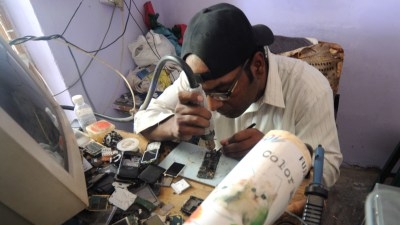KOKAN JAND, TEHSIL GOJAR KHAN, RAWALPINDI DISTRICT, PUNJAB PROVINCE, Pakistan – Mohammad Shafiq started business in the dark, literally. Not only did the 35-year-old know little about mobile phone repair, but he also launched his tiny enterprise on a street without light.
“All I had was a table by the road,” Shafiq recalls, “so after the sunset, I couldn’t continue my work.” Shafiq persevered this way for a short while in 2002 before learning about a loan program run by Pakistan Poverty Alleviation Fund (PPAF).
The government of Pakistan created PPAF to provide loans, grants, and technical assistance to the poorest individuals and communities in the country. PPAF is mainly funded by $891 million in credits over time from the World Bank.

